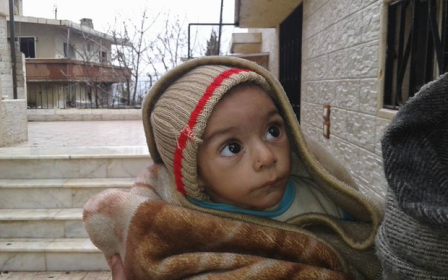Syria's besieged Daraya to get first aid since 2012 - but not food

Aid agencies are to deliver relief supplies to the besieged Syrian rebel-held town of Daraya on Thursday, the first since 2012, the International Committee of the Red Cross said.
Food, however, is not among the materials delivered, Daraya's local council said on Thursday morning in a Facebook post and aid agencies confirmed.
Five trucks organised by the ICRC, the UN and the Syrian Arab Red Crescent were to deliver baby milk and medical and school supplies to the town which is within a few miles of aid warehouses in the capital.
"We see this as a breakthrough, but not a success," International Red Cross Pawel Krzysiek spokesman told Middle East Eye from a buffer zone near Daraya on Thursday, waiting for the convoy to arrive.
Krzysiek said that this first convoy to arrive in Daraya since November 2012 should be seen as "confidence-building opportunity".
"We are urging everyone who is responsible on the ground to allow this needed aid to Dararya," he said.
Daraya had a pre-war population of around 80,000 people but that has dropped by almost 90 percent, with remaining residents suffering from severe shortages and malnutrition.
Last month, 47 women in the Syrian town sent an open letter saying they were on the verge of witnessing their children and relatives starve to death if aid did not reach them soon.
Since November 2012, when the government's siege on Daraya started, residents have survived off food smuggled in from a nearby town and whatever crops they could grow. Two years ago, the government cut off the town's water supplies.
This January, the crisis in the town quickly escalated when the road to the next town was cut off and frequent government bombing left Daraya's drinking water, siphoned from shallow wells, and farmland contaminated with toxic chemicals, a resident told MEE last month.
Sawsan al-Abaar, one of the signatories of the letter, told MEE last month that she and other women – many of whom, she said, have lost the breadwinners in their families - sent their letter to the world because they “no longer have the patience to be silent”.
“We are seeing our children starting to look like skeletons, our one-year-old babies like three-month olds,” she said. “We are counting on the conscience of the world to help.”
The UN says more than 486,000 people are living under siege in Syria, more than half of them in areas besieged by the government.
Siege Watch, an independent monitoring network, however has said that the total number of Syrians besieged is more than a million, while the NGO Doctors Without Borders (MSF) puts it at almost 2 million.
New MEE newsletter: Jerusalem Dispatch
Sign up to get the latest insights and analysis on Israel-Palestine, alongside Turkey Unpacked and other MEE newsletters
Middle East Eye delivers independent and unrivalled coverage and analysis of the Middle East, North Africa and beyond. To learn more about republishing this content and the associated fees, please fill out this form. More about MEE can be found here.




